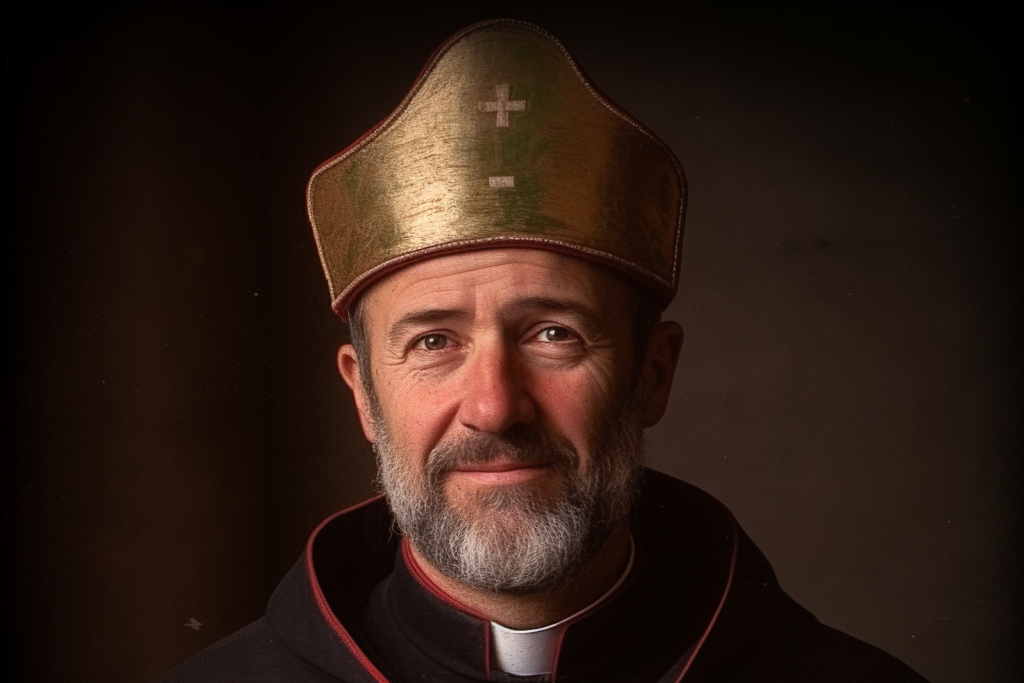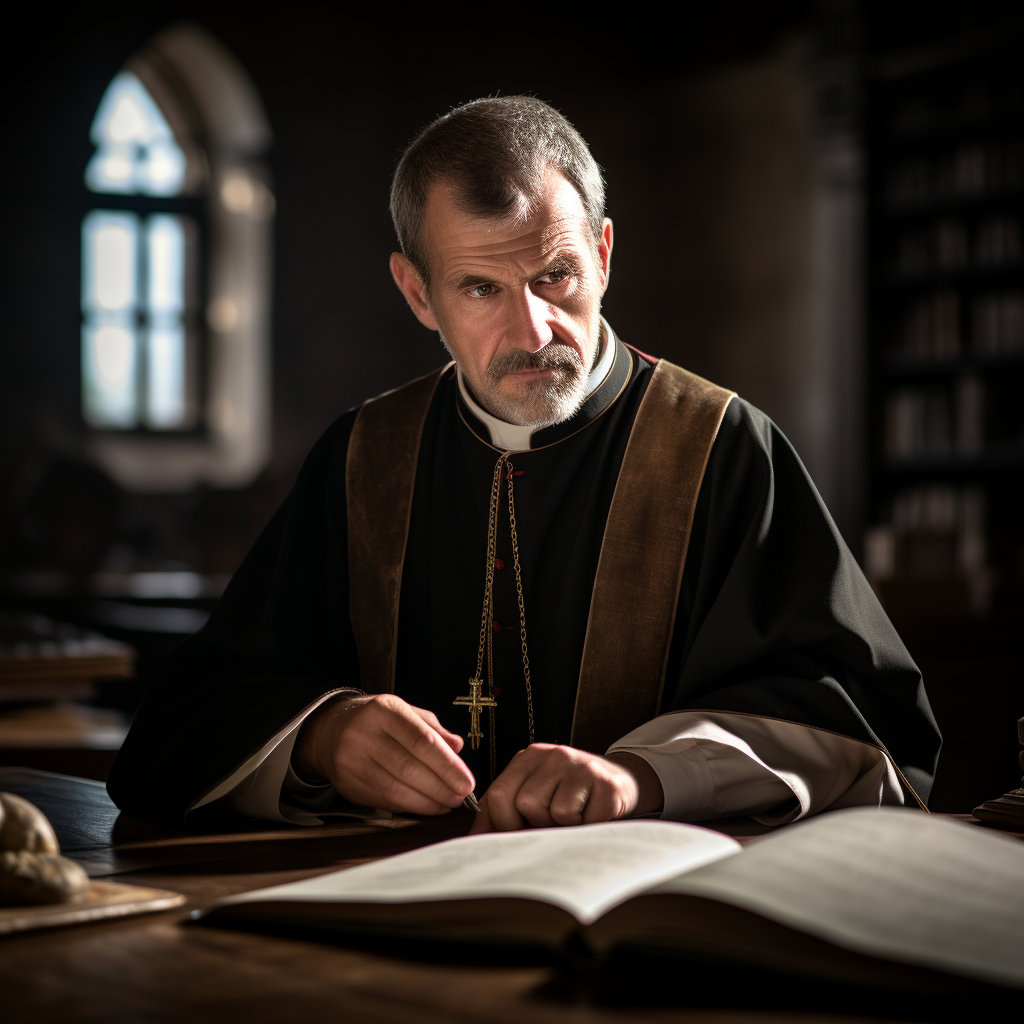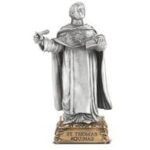
St. Hilary of Poitiers
Saint Hilary of Poitiers
When they lived:
St. Hilary of Poitiers, also known as Hilarius, lived during the 4th century. He was born around 310 AD and passed away in 367 AD.
Where they lived:
St. Hilary of Poitiers lived in Poitiers, a city in the western part of present-day France. This region was known for its vibrant Christian community during his time.
Notable world events during the time of their life:
- The Council of Nicaea (325 AD): This landmark event in Christian history aimed to address the Arian controversy, specifically the nature of the relationship between Jesus and God the Father. The Nicene Creed was formulated during this council, establishing important doctrinal foundations for Christianity.
- The Edict of Milan (313 AD): Issued by Emperor Constantine, this edict granted religious tolerance to Christians within the Roman Empire. It marked a significant turning point in the history of Christianity, leading to its eventual establishment as the state religion.
- The Fall of the Western Roman Empire: St. Hilary lived during a time of great turmoil in the Roman Empire. The Western Roman Empire faced numerous challenges, including invasions by various Germanic tribes. The events leading up to the fall of the Western Roman Empire in 476 AD had significant cultural and political repercussions for Europe.
- The Birth of Monasticism: During St. Hilary’s lifetime, monasticism began to gain prominence in Christian practice. Figures like St. Anthony the Great and St. Pachomius laid the foundations for monastic communities, which became influential centers of spirituality and learning in the medieval period.
Their patronage:
St. Hilary of Poitiers is recognized as the patron saint of scholars, students, and theologians. His commitment to defending and explaining the Christian faith, as well as his prolific writings, make him an important figure in the history of theological thought. His dedication to education and his efforts to bridge the gap between the Latin-speaking West and the Greek-speaking East contributed significantly to the development of early Christian doctrine. St. Hilary’s intellectual legacy continues to inspire those who seek to deepen their understanding of theology and Christian teachings.

Early Life
Although Saint Hilary believed in the Divinity of God, it hadn’t always been that way.
The date of birth of Saint Hilary cannot be pinpointed or established as a fact. Saint Hilary was born in Poitiers between the end of the 3rd and the beginning of the 4th century A.D. He was born to pagan parents.
Saint Hilary grew up receiving an extensive and quality education in various subjects, including Greek. He took great interest in the writing of the Old and New Testaments. He was so invested in the writings that he took an interest in the religion and abandoned Neoplatonism for Christianity.
Saint Hilary was held in high esteem so much that between the years 350 and 353, he was voted Bishop by all of Poitier.
Dedication and Devotion
It was at that time that the Arian Heresy threatened to take down the Orthodox Christian Church. Hilary took a stand against the Arians, refusing to let their beliefs be forced upon the people.
One of the methods by which Saint Hilary took a stand against Arianism was by protecting the excommunication. Saint Hilary also sent a letter to Constantius II, a Roman Emperor who backed the Arians. His efforts to convince the Emperor to stop the persecution of Orthodox Christians, however, were not successful.
Between the years 356 and 360, Saint Hilary was banished to Phrygia, somewhere in Ancient Greece, by the Command of Constantius as a punishment for not renouncing in support of Arian’s biggest enemy, Saint Athanasius the Great.
While in exile, Saint Hilary remained Bishop and continued to guide his people. He continued to write while in exile, creating books that would continue to be important to theology in the coming years.
Saint Hilary continued to remain a staunch believer in the divinity of God’s trinity. He continued to attend synods. He continued and failed to secure a chance to see Constantius in order to plead for public debates with his opponents. He didn’t stop until his opponents considered him a threat and had him return home to his diocese.
On his return to his diocese, Saint Hilary continued to fight against Arianism, striving to call out the semi-Arian Bishops in Gaul, Germania, and Britain. In 364, Saint Hilary impeached Auxentius, a Bishop who supported the Arians but, as a result, got exiled from Milan.
He continued to write about his failed attempts against the Arians, with some of his works exposing bishops and rulers who stood in full support of the Arians.
Death and Canonization
Saint Hilary of Poitiers died in 367. He is highly respected, and his works continue to remain influential in Christianity today.
Saint Hilary was declared a doctor of the church in 1851. He is celebrated by the Catholic Church and remembered by the Anglican Communion on the 13th of January.
5 Interesting Facts About Saint Hilary of Poitiers
- Did you know that some people consider Saint Hilary the first Latin Christian hymn writer? It is speculated that he has three hymns attributed to him.
- Did you know that Saint Hilary’s daughter, Abra, is a venerated saint? Saint Abra was a nun, although she was also born a pagan. She took a vow of virginity on her father’s advice.
- Did you know that Saint Hilary is also cited as a patron saint against snake bites, snakes, and rheumatism?
- Did you know that Saint Hilary wrote the first Latin Commentary on Matthew to survive until today? He did this in his book Commentarius in Evangelium Matthaei, which he wrote before the exile.
- Did you know Saint Hilary’s major impact on theology was the 12 books he wrote during exile? The books are known as De Trinitate.
Prayer to Saint Hilary of Poitiers
Grant, we pray to You, Almighty God, that the example of St. Hilary and that of all Your Saints may lead us to a better life, so that by keeping their feast days we may be brought to imitate their good deeds. St. Hilary was a champion of the Truth; may we never tell lies to excuse ourselves, to hurt others, to gain, or to make ourselves look more important. Through Christ, Our Lord Amen.
Source: [https://www.google.com/amp/s/prayers4reparation.wordpress.com/2012/01/17/prayer-to-st-hilary-patron-of-all-tempted-to-tell-lies/amp/] {.ul}



